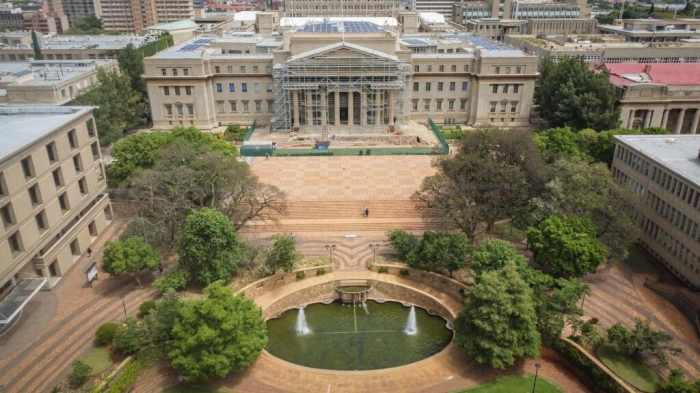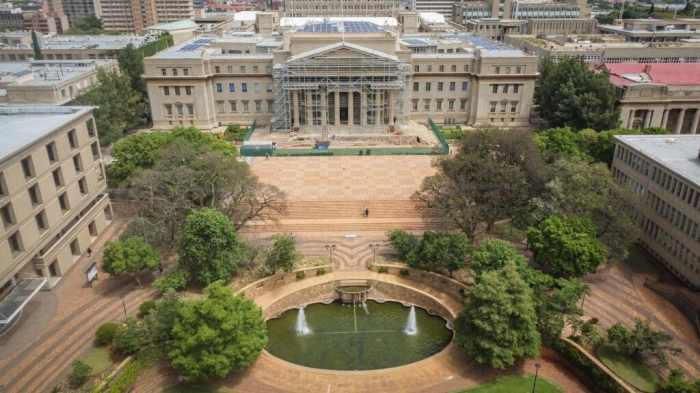
Study in South Africa, a land brimming with vibrant culture and diverse opportunities. This comprehensive guide dives into the South African education system, from primary to tertiary levels, exploring the various institutions, academic culture, and associated costs. We’ll also examine the application process, living expenses, visa requirements, and academic support available to international students. Discover the potential career paths and cultural experiences that await you in South Africa.
From choosing the perfect study program to navigating the visa process, this guide will provide you with a clear understanding of what to expect when embarking on your educational journey in South Africa. We’ll delve into the specific academic disciplines offered, the unique aspects of the South African curriculum, and compare it to similar programs internationally. Understanding the cost of living, transportation, and accommodation in different regions will help you plan your budget effectively.
Introduction to Studying in South Africa

South Africa boasts a vibrant and diverse education system, reflecting its multicultural society. From foundational primary education to advanced tertiary studies, the system offers a range of options for aspiring students. Understanding the structure, costs, and academic culture is crucial for prospective students considering a South African education.
Overview of the South African Education System
The South African education system is structured into three main levels: primary, secondary, and tertiary. Each level builds upon the previous one, culminating in opportunities for higher education and specialized training. The system is designed to equip students with the knowledge and skills necessary to thrive in a globalized world.
Levels of Education
The primary education phase lays the groundwork for future learning. This stage typically encompasses grades 1 to 9, fostering fundamental literacy, numeracy, and critical thinking skills. Following primary school, secondary education, typically grades 10 to 12, prepares students for tertiary studies or the workforce. This phase deepens subject knowledge and equips students with advanced analytical and problem-solving skills.
Tertiary education encompasses a wide array of institutions, offering specialized training and opportunities for academic research.
Types of Educational Institutions
South Africa offers a variety of institutions for tertiary education. Universities are renowned for their research-oriented programs, leading to undergraduate and postgraduate degrees. Colleges often focus on vocational training and professional development, leading to diplomas, certificates, and other professional qualifications. Technical schools provide specialized instruction in technical and practical skills, equipping students with the necessary competencies for careers in specific trades and industries.
These institutions cater to diverse learning needs and aspirations.
Academic Culture and Expectations
South African academic culture emphasizes critical thinking, intellectual curiosity, and a collaborative learning environment. Students are encouraged to actively participate in discussions, engage with complex ideas, and develop their own perspectives. Academic integrity is highly valued, and students are expected to maintain high ethical standards in their work. The emphasis on inclusivity and diversity is also a key aspect of the academic environment.
Students are expected to respect differing viewpoints and actively contribute to a supportive learning community.
Costs of Studying in South Africa
| Level of Education | Estimated Annual Cost (ZAR) |
|---|---|
| Primary School | Approximately ZAR 20,000 – ZAR 40,000 |
| Secondary School | Approximately ZAR 30,000 – ZAR 60,000 |
| Undergraduate Degree (University) | Approximately ZAR 60,000 – ZAR 120,000 |
| Postgraduate Degree (University) | Approximately ZAR 80,000 – ZAR 150,000 |
| Vocational Training (College) | Approximately ZAR 20,000 – ZAR 50,000 |
Note: These figures are estimates and may vary significantly based on the specific institution, program, and living expenses. Students should conduct thorough research and contact institutions directly for accurate cost information.
Choosing a Study Program
South Africa offers a diverse range of academic programs across various disciplines, catering to diverse interests and career aspirations. Understanding the available options, popular choices, and the application process is crucial for prospective students. This section provides a comprehensive overview of the study program selection process, highlighting key considerations for students interested in pursuing higher education in South Africa.South Africa’s academic landscape is robust, with institutions renowned for their quality teaching and research.
Students can find programs aligned with their specific goals, from traditional disciplines to emerging fields. This section delves into the available options, allowing prospective students to make informed decisions about their future studies.
Academic Disciplines Offered
South Africa boasts a wide array of academic disciplines, spanning the humanities, social sciences, natural sciences, engineering, and technology. This breadth ensures that students can find programs aligned with their interests and career goals. From traditional fields like law and medicine to cutting-edge fields like data science and renewable energy, the opportunities are extensive.
Thinking about studying in South Africa? It’s a fantastic opportunity to immerse yourself in a vibrant culture, but also requires a strong ability to execute on ideas and other magic acts. That means having the drive to tackle new challenges and make the most of your time, like those covered in the article on executing on ideas and other magic acts.
Ultimately, the key to a successful study experience in South Africa is to be proactive, resourceful, and prepared to work hard to achieve your goals.
Popular Study Fields and Career Prospects
Business management, engineering, and law consistently rank among the most popular study fields in South Africa. These fields offer strong career prospects, with graduates often securing high-paying jobs in the private sector or government. For example, graduates in engineering are in high demand across various industries, including construction and manufacturing. Similarly, the legal profession provides numerous opportunities for career advancement.
Curriculum Comparison
Comparing the curricula of similar programs in South Africa with those in other countries reveals both similarities and differences. South African programs often emphasize practical application and hands-on learning, while some international programs may prioritize theoretical knowledge. For instance, an engineering program in South Africa might include more practical projects and internships, fostering real-world skills development.
Application Procedures
Application procedures for various study programs in South Africa generally follow a similar format. Students need to gather required documents, complete online applications, and submit them to the chosen university. The specific requirements may vary slightly depending on the program and the institution. Students should carefully review the program’s website and the university’s application guidelines for detailed instructions.
Popular Universities and Specializations
| University | Specializations |
|---|---|
| University of Cape Town | Law, Medicine, Economics, Engineering |
| University of Witwatersrand | Mining Engineering, Medicine, Business Management |
| Stellenbosch University | Agriculture, Business Administration, Law |
| University of KwaZulu-Natal | Nursing, Pharmacy, Education, Environmental Science |
| North-West University | Engineering, Agriculture, Business, Education |
This table provides a concise overview of popular South African universities and their prominent specializations. Prospective students should research individual programs within these universities to find the best fit for their specific needs and interests.
Living in South Africa
Embarking on a study journey in South Africa promises an enriching experience, blending vibrant culture with academic pursuits. Beyond the classroom, understanding the nuances of South African life is key to a smooth and enjoyable transition. This section explores the lifestyle, costs, cultural considerations, and practical aspects of living in South Africa as a student.South Africa’s diverse tapestry of cultures creates a unique atmosphere.
From bustling city centers to serene countryside villages, the country offers a wide range of experiences. Understanding the cost of living, accommodation options, and transportation systems is crucial for effective budgeting and planning. This will help you navigate the daily realities of student life and make the most of your time in South Africa.
South African Lifestyle
South African society is incredibly diverse, encompassing a multitude of cultures and traditions. Warm hospitality and a welcoming attitude are common traits, fostering a strong sense of community. A blend of modern influences and traditional customs shapes the daily lives of South Africans. This diversity manifests in various aspects of daily life, from food to celebrations, and from communication styles to social norms.
Cost of Living in Different Cities and Regions
The cost of living varies significantly across South Africa’s cities and regions. Major metropolitan areas like Johannesburg and Cape Town tend to have higher costs compared to smaller towns and rural areas. Factors such as housing, transportation, and the availability of specific goods and services influence these differences. This variability in cost of living needs to be carefully considered when choosing a location for study and accommodation.
For example, accommodation in Johannesburg will likely be more expensive than in a smaller town outside the city.
Cultural Norms and Etiquette
South Africa is a nation of diverse cultures. Respect for cultural differences and traditions is vital. Building rapport and trust with local people is often fostered through showing genuine interest in their backgrounds and perspectives. Understanding and respecting the local customs will make your experience in South Africa more enjoyable and productive. Always be mindful of the social hierarchy and protocols that exist within different communities.
Accommodation Options for Students
Numerous accommodation options cater to student needs in South Africa. These include student residences, shared apartments, and privately rented rooms. Student residences often offer a supportive community environment and convenient amenities. Shared apartments provide a more independent living experience. Private rentals allow for more flexibility in terms of location and personal preferences.
Careful consideration of location, budget, and desired level of independence is important when selecting accommodation.
Local Transportation Systems
South Africa’s transportation infrastructure varies depending on the location. Public transportation systems, including buses and trains, are available in major cities, but their reliability and coverage can vary. Private vehicles are common, and car ownership is a frequent choice, particularly in certain regions. Understanding the specific transportation options in the area where you choose to study is essential.
Students should factor in the time it takes to travel between their accommodation and their university when choosing a location.
Average Monthly Costs
| Category | Average Monthly Cost (ZAR) |
|---|---|
| Accommodation | 3,000 – 7,000 |
| Food | 2,000 – 4,000 |
| Transportation | 500 – 1,500 |
Note: These figures are averages and can fluctuate based on individual circumstances and choices. The actual cost of living in South Africa can vary considerably depending on factors like location, lifestyle, and personal preferences. For instance, a student living in a more expensive part of Cape Town might face higher costs compared to one residing in a smaller town.
Visa and Immigration Requirements
Navigating the visa application process can be daunting, but understanding the requirements is crucial for a smooth transition to your studies in South Africa. Thorough preparation and adherence to regulations will greatly reduce stress and ensure a timely approval. This section will detail the visa application process, required documents, visa types, duration, and renewal procedures, providing a comprehensive guide for international students.
Visa Application Process for International Students
The visa application process for international students involves several steps and requires meticulous attention to detail. Submitting accurate and complete documentation is paramount. Each application is assessed individually, and any discrepancies may lead to delays or rejection. Applicants should carefully review the specific requirements of their nationality, as these may vary.
Necessary Documents and Supporting Materials
A comprehensive list of documents is essential for a successful visa application. These include but are not limited to:
- Passport (with at least six months validity beyond the intended stay)
- Proof of acceptance from the South African institution (acceptance letter)
- Financial documents demonstrating sufficient funds to cover tuition fees and living expenses (bank statements, sponsor letters)
- Medical records and proof of health insurance (if applicable)
- Criminal record check (police clearance certificate) from the applicant’s home country
- Letters of recommendation from previous academic institutions (in some cases)
- Curriculum vitae (CV)
These documents provide evidence of the applicant’s identity, academic standing, financial stability, and health status. All documents must be certified and translated into English or Afrikaans, if necessary.
Types of Student Visas Available
Different types of student visas are available depending on the duration and nature of the study program. The most common types include:
- Student visa (e.g., for a specific course or program): This is the primary visa for academic pursuits. It specifies the length of stay and the institution where the student will be studying.
- Research visa (e.g., for conducting research): This visa allows individuals to conduct research at a South African institution for a specific period, often requiring supporting documentation related to the research project.
These visas cater to diverse academic and research needs.
Thinking about studying in South Africa? It’s a fantastic option, but imagine seamlessly blending your studies with a vibrant social life. This is totally possible in the high-tech hotel lobbies, perfect for networking and grabbing a quick bite while you work on that next assignment. Check out mixing work and play the high tech hotel lobby for some inspiring ideas on how to make the most of your downtime.
Ultimately, South Africa offers incredible opportunities for students looking to soak up the culture and build their careers.
Duration and Renewal Processes for Student Visas
The duration of a student visa is typically linked to the length of the study program. Students should carefully review the visa conditions and the duration specified on their visa document.
- Renewal: Renewal of a student visa is possible if the student continues their studies and fulfills the requirements.
- Important Note: Students must adhere to all visa regulations and terms of their visa to avoid complications.
Students should seek guidance from the South African Department of Home Affairs or relevant embassy/consulate for the specific procedures.
Step-by-Step Guide for the Visa Application Process
- Research: Thoroughly research the visa requirements specific to your nationality. Visit the South African Department of Home Affairs website for the most current information.
- Gather Documents: Compile all necessary documents and ensure they meet the required format and specifications.
- Application Submission: Complete the visa application form accurately and submit it along with all supporting documents to the relevant South African embassy or consulate.
- Visa Processing: Allow sufficient time for the visa application processing. This varies depending on the circumstances and may take several weeks or months.
- Visa Collection: If approved, collect the visa from the appropriate embassy or consulate.
Following these steps will streamline the process and enhance your chances of success.
Visa Requirements for Different Nationalities
A table summarizing visa requirements for different nationalities is not possible to provide without access to a database of specific requirements for each country. The South African Department of Home Affairs website provides detailed information regarding visa requirements for various nationalities. Consult this official source for specific and up-to-date information.
| Nationality | Specific Visa Requirements |
|---|
Academic Resources and Support
Navigating a new academic environment, especially internationally, can be challenging. South African universities offer extensive resources and support systems to help international students succeed. Understanding these resources is crucial for a smooth transition and academic achievement. This section will detail the available academic support and how to access them.International students benefit from a comprehensive array of academic resources designed to foster success.
These resources extend beyond the classroom, providing tools and support for students to excel in their chosen field of study. Support services range from language assistance to academic advising and counselling, creating a supportive ecosystem for students to thrive.
Language Support and Tutoring
Many South African universities offer dedicated language support programs for international students. These programs often include English language courses tailored to academic needs. They might involve intensive workshops, practice sessions, and personalized feedback from qualified instructors. Tutoring services are frequently available, providing one-on-one or small group support to help students improve their understanding of specific subjects. This tailored support enhances comprehension and ensures students can effectively participate in lectures and seminars.
Dreaming of studying in South Africa? It’s a fantastic choice, offering vibrant culture and diverse learning opportunities. However, even in the most promising academic environments, cyber threats are a growing concern. This is why understanding 6 critical technologies for combating targeted attacks, like those discussed in this excellent article 6 critical technologies for combating targeted attacks , is crucial for future success, both personally and professionally.
Thankfully, South African universities are likely to have strong cybersecurity protocols in place, ensuring a safe and secure learning environment for all students.
Library Resources and Online Databases
University libraries in South Africa are well-equipped with extensive collections of books, journals, and other academic materials. These libraries also provide access to a variety of online databases, offering students a vast repository of scholarly information, research articles, and digital resources. This access is critical for research, assignments, and staying current with the latest developments in their chosen fields of study.
Students can utilize the library’s extensive resources to excel in their academic endeavors.
Student Support Services and Counselling
University support services are available to help students address any challenges they may encounter during their studies. This support can include academic advising, career counselling, and personal counselling. Academic advisors can guide students in choosing courses, planning their academic schedules, and navigating the university’s academic regulations. Counsellors provide support to help manage stress, address personal issues, and maintain mental well-being.
Table of Academic Support Services
| Service | Description | Contact Information |
|---|---|---|
| English Language Support | Intensive English language courses and workshops tailored to academic needs. | [Insert specific contact details for the language support program at each university] |
| Tutoring Services | One-on-one or small group tutoring for specific subjects. | [Insert specific contact details for tutoring services at each university] |
| Library Resources | Extensive collections of books, journals, and online databases. | [Insert library website address and contact information] |
| Academic Advising | Guidance on course selection, academic planning, and university regulations. | [Insert specific contact details for academic advising] |
| Counselling Services | Support for stress management, personal issues, and mental well-being. | [Insert specific contact details for counselling services] |
Career Opportunities and Prospects
South Africa boasts a dynamic job market, offering diverse opportunities for graduates in various sectors. Understanding the current landscape and potential career paths is crucial for students planning their future. This section explores the job market, high-demand industries, potential career paths, available support, and methods for researching career prospects in South Africa.The South African job market is characterized by a blend of established industries and emerging sectors.
While some industries face challenges, others show significant growth potential. The availability of specific jobs often depends on factors such as skill sets, qualifications, and location. Prospective graduates should actively research industries and potential career paths that align with their interests and qualifications.
Job Market Overview for Graduates
The South African job market welcomes graduates with relevant skills and qualifications. Competition is often present, but graduates with practical experience and specialized knowledge are in higher demand. Many companies actively seek candidates who can contribute to existing projects or spearhead new initiatives. This often involves internships, volunteer work, or personal projects that showcase the candidate’s capabilities.
Strong communication, teamwork, and problem-solving skills are highly valued across various sectors.
High-Demand Industry Sectors
Several sectors consistently demonstrate high demand for graduates. These include:
- Information Technology (IT): The IT sector remains a major driver of the economy, with a significant need for software developers, data analysts, cybersecurity specialists, and IT support personnel. The growing reliance on technology across industries creates ample opportunities for graduates with relevant IT skills.
- Finance and Banking: South Africa’s financial sector is a significant employer. Graduates with financial analysis, accounting, and banking skills are sought after for various roles, from entry-level analysts to senior management positions.
- Engineering and Construction: Infrastructure development and the ongoing need for skilled engineers, architects, and construction professionals are key drivers of employment in this sector.
- Healthcare: The healthcare sector consistently requires skilled professionals like nurses, doctors, and medical technicians. The demand for healthcare professionals is expected to increase in the coming years.
Potential Career Paths for Students
The career path options for graduates are diverse and dependent on the specific field of study.
- Engineering Students: Potential career paths include civil engineers, mechanical engineers, chemical engineers, and environmental engineers, each with a wide range of specializations and employment opportunities.
- Business Administration Students: Graduates can pursue careers in management, marketing, finance, and accounting, potentially leading to roles in business analysis, operations management, or financial planning.
- Education Students: A career in teaching, curriculum development, or educational administration is possible for graduates in education. Various levels of education, from primary to tertiary, present opportunities.
Job Placement Services for Students, Study in south africa
Many universities and colleges offer job placement services to assist students in finding suitable employment.
- Career Centers: These centers provide resources such as resume writing assistance, interview preparation, networking opportunities, and access to job boards. These resources can be invaluable in navigating the job market.
- Networking Events: Networking events provide a platform for students to connect with potential employers and build professional relationships. These events often offer valuable insights into industry trends and current employment needs.
- Internships and Apprenticeships: Internships and apprenticeships provide invaluable practical experience and can lead to permanent employment opportunities.
Researching Career Opportunities
Researching career opportunities in South Africa requires a multi-faceted approach.
- Online Job Boards: Online job boards like Indeed, LinkedIn, and local job sites provide a comprehensive overview of current job postings. Regularly checking these platforms can help identify potential openings.
- Industry Events and Conferences: Attending industry events and conferences allows students to learn about current trends and meet potential employers. These events offer valuable networking opportunities.
- Professional Organizations: Professional organizations often provide resources and information about career paths and employment opportunities in specific fields. Joining these organizations can offer invaluable insights into the job market.
Job Market Trends and Salary Ranges
| Specialization | Job Market Trend | Expected Salary Range (ZAR) |
|---|---|---|
| Software Developer | High demand, continuous growth | 400,000 – 800,000 per annum |
| Financial Analyst | Steady demand, competitive market | 350,000 – 700,000 per annum |
| Civil Engineer | Moderate demand, infrastructure projects | 300,000 – 600,000 per annum |
| Nurse | High demand, critical sector | 200,000 – 450,000 per annum |
Note: Salary ranges are estimates and can vary based on experience, location, and specific skills.
Cultural Experiences and Integration
South Africa boasts a vibrant tapestry of cultures, offering a unique and enriching experience for international students. Immersion in these diverse traditions is a significant part of the learning process, allowing students to broaden their perspectives and develop a deeper understanding of the world. Embracing this cultural richness is essential for a positive and rewarding study experience.
Diverse Cultural Experiences
South Africa is renowned for its multiculturalism, encompassing a multitude of ethnic groups, languages, and traditions. From the Zulu and Xhosa in the eastern regions to the Afrikaans and English speakers in the western areas, the country showcases a remarkable diversity. This diversity manifests in various forms of art, music, cuisine, and social practices, providing a dynamic and enriching environment for international students.
Understanding these differences is crucial for navigating and appreciating the cultural nuances of South African society.
Local Festivals and Traditions
South Africa is a nation brimming with vibrant festivals and traditions. The annual Durban July horse racing event, for instance, draws large crowds and showcases the energy of the city’s cultural scene. The vibrant colours and rhythms of the Springbok celebrations, marking the national rugby team’s victories, are further examples of the nation’s passionate spirit. Furthermore, numerous smaller local festivals and celebrations often mark significant events in the communities, offering unique opportunities to engage with local traditions and gain insights into community life.
Cultural Sensitivity and Respect
Cultural sensitivity and respect are paramount for fostering positive interactions and meaningful connections within South African society. Understanding and appreciating the diverse perspectives and beliefs of others is key to building strong relationships and creating a welcoming environment for all. Showing genuine interest in the local culture and customs is essential. Respectful communication and mindful actions are essential for demonstrating cultural sensitivity and creating positive experiences for everyone involved.
Strategies for Effective Integration
Effective integration into South African society involves proactive engagement and a willingness to learn and adapt. Taking the initiative to engage with local communities, participating in cultural activities, and actively seeking opportunities to learn about South African traditions are crucial steps. Learning basic phrases in local languages, such as Zulu or Xhosa, is an effective way to connect with locals and show respect.
Connecting with Local Communities
Engaging with local communities is vital for effective integration. Volunteering at local charities, joining community groups, or attending local events are excellent ways to build relationships and experience South African life firsthand. Local markets and community gatherings provide opportunities to interact with people from different backgrounds and gain insights into local customs and values. Visiting local farms and markets allows for hands-on experiences and interactions with local producers.
Cultural Events and Organizations for International Students
Numerous organizations and events cater specifically to international students. University student unions often host cultural exchange programs, workshops, and social events that connect students with different backgrounds. International student organizations provide platforms for interaction and support. Some universities and cultural centers organize workshops on South African culture, customs, and etiquette. Local community centres also host cultural events.
- International student organizations:
- University student unions:
- Cultural centres:
- Local community centres:
Practical Advice for Studying Abroad: Study In South Africa
Embarking on a study abroad journey is an exciting but daunting experience. It demands meticulous preparation, financial prudence, and a willingness to adapt to a new environment. This section provides practical tips to help students navigate the challenges and make the most of their international study experience in South Africa.This guide offers a comprehensive approach to studying abroad, encompassing essential packing lists, financial management strategies, and crucial tips for cultural integration.
These practical strategies will equip students with the tools they need to thrive academically and personally during their time in South Africa.
Essential Packing Tips
Packing for an international move requires careful consideration. Packing light is crucial for ease of transportation and storage. Choose versatile clothing items that can be mixed and matched. Prioritize quality over quantity. Consider the climate of South Africa and pack accordingly.
Remember to pack necessary documents like your passport, visa, and student ID. Don’t forget personal items like toiletries, medications, and any sentimental items.
- Pack versatile clothing items that can be mixed and matched.
- Prioritize quality over quantity.
- Consider the South African climate when packing.
- Include necessary documents (passport, visa, student ID).
- Don’t forget personal items like toiletries, medications, and sentimental items.
Financial Management Strategies
Managing finances is crucial for a smooth study abroad experience. Create a detailed budget that accounts for tuition fees, accommodation, food, transportation, and entertainment expenses. Explore scholarship opportunities and part-time work options to mitigate financial strain. Open a local bank account for easier transactions and access to local payment methods. Be mindful of exchange rates and utilize budgeting apps to track expenses.
- Create a detailed budget encompassing all expenses.
- Explore scholarship opportunities and part-time work options.
- Open a local bank account for easier transactions.
- Be mindful of exchange rates and use budgeting apps.
Overcoming Challenges and Adapting to a New Environment
Adjusting to a new environment involves embracing new experiences and challenges. Learn basic phrases in the local language (Afrikaans or English). Engage with local communities and activities to build friendships and connections. Seek support from international student organizations or campus resources. Be open to new experiences and cultures.
Embrace the differences and learn from them. If facing difficulties, don’t hesitate to reach out to mentors, advisors, or support networks.
- Learn basic phrases in the local language.
- Engage with local communities and activities.
- Seek support from international student organizations.
- Embrace new experiences and cultures.
- Don’t hesitate to seek support if needed.
Maintaining Connections with Loved Ones
Maintaining connections with family and friends back home is essential for well-being. Use technology to stay in touch through video calls, social media, and emails. Plan regular visits home, if possible. Share your experiences and stay updated on what’s happening back home. Keeping those connections strong will provide support and a sense of belonging.
- Use technology for frequent communication (video calls, social media).
- Plan regular visits home if possible.
- Share your experiences and stay updated on what’s happening back home.
Essential Items Checklist for International Students Moving to South Africa
| Category | Items |
|---|---|
| Documents | Passport, visa, student ID, immunization records, health insurance information |
| Accommodation | Basic bedding, towels, toiletries, cleaning supplies, cooking utensils (if applicable) |
| Clothing | Versatile clothing suitable for South Africa’s climate, comfortable shoes, and appropriate attire for cultural events |
| Electronics | Phone, charger, laptop, and other essential electronics |
| Personal Items | Toiletries, medications, and any personal items |
Summary

In conclusion, studying in South Africa presents a unique opportunity for personal and academic growth. This guide has provided a comprehensive overview of the education system, the application process, living expenses, visa requirements, and career prospects. From the diverse academic disciplines offered to the vibrant cultural experiences, South Africa promises a fulfilling and unforgettable educational adventure. We hope this guide has provided you with the necessary information to make an informed decision about your future studies in this remarkable country.





